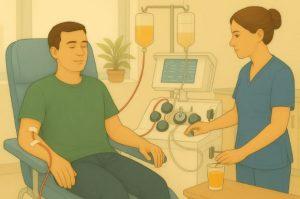Blood donation in the UK is a simple yet life-saving act that helps thousands of patients every day. Managed by NHS Blood and Transplant, the process ensures hospitals receive vital blood and components for surgeries, emergencies, and ongoing treatments. Whether in London or across the country, each donation plays a critical role in saving lives and supporting the healthcare system.
What Is Blood Donation in the UK?

Blood donation in the UK is a vital service managed by NHS Blood and Transplant (NHSBT). Every day, thousands of patients rely on donated blood for surgeries, cancer treatments, emergency trauma care, and childbirth complications. Without generous donors, hospitals would struggle to meet the constant demand for blood.
The UK requires around 5,000 blood donations daily to maintain supply. This figure highlights the crucial role of blood donors in saving lives. Blood donation is voluntary and strictly regulated to ensure safety for both donors and recipients, making it one of the most impactful ways a person can contribute to healthcare.
Who Is Eligible to Donate Blood in the UK?
Eligibility for blood donation ensures the process is safe for the donor and effective for the recipient.
Age and Weight Criteria
Individuals must be between 17 and 65 years old to register as first-time donors, and they must weigh at least 50 kg (7st 12lb). Meeting these criteria ensures the donor can safely give blood without health risks.
Health Considerations
Donors should be in good general health. Blood donation may be postponed if a person has a recent infection, cold, or fever, or if they are on certain medications. Those who have recently traveled to countries with higher infection risks, such as malaria zones, may also need to wait before donating.
Donation Frequency
Donation frequency is carefully regulated to protect iron levels in the blood. Men can donate every 12 weeks, while women can donate every 16 weeks. These intervals ensure the donor’s body has time to fully recover before the next session.
How Does the Blood Donation Process Work in the UK?
The process of blood donation in the UK is straightforward and usually takes less than an hour. It involves three key stages: registration and health checks, donation, and recovery.
Registration and Health Check
When a donor arrives at a centre, staff confirm their details and perform a brief health screening. A finger-prick test is used to check haemoglobin levels, and a short questionnaire helps determine eligibility.
The Donation Itself
Once cleared, the donor sits comfortably while a sterile needle is inserted into a vein, and around 470 ml of blood is collected. The procedure itself lasts roughly 5 to 10 minutes and is largely painless aside from a slight prick at the start.
Recovery and Aftercare
After the donation, the donor rests for about 10 to 15 minutes and enjoys light refreshments to help restore energy levels. Staff ensure that donors feel well before they leave the centre.
Where Can You Donate Blood in London and Across the UK?

Blood donation centres are widely accessible, with London offering both permanent and mobile options. Permanent centres are located in central areas, while mobile donation sessions regularly visit schools, community halls, and workplaces.
Appointments can easily be booked through the NHS Give Blood website or mobile app. This system allows donors to select the most convenient location and time, ensuring flexibility for busy schedules.
What Are the Benefits and Risks of Blood Donation?
Blood donation carries numerous benefits while having very minimal risks.
Benefits of Donating Blood
Donating blood saves lives and gives donors the satisfaction of knowing they have made a tangible difference. Each donation can help up to three patients, as blood is separated into red cells, plasma, and platelets. Donors also receive a mini health check every time they give blood, which can occasionally detect health issues early.
Potential Risks
Risks are rare and typically minor, such as feeling lightheaded or experiencing mild bruising at the needle site. NHS staff are trained to manage these occurrences, making the process very safe overall.
How Often Can You Donate Blood in the UK?
The frequency of donation depends on the type of donation and the donor’s gender.
| Type of Donation | Eligibility | Frequency | Approximate Time Taken |
| Whole Blood Donation | Men and Women | Men: Every 12 weeks Women: Every 16 weeks |
45 minutes to 1 hour |
| Platelet Donation | Selected donors | Every 2 to 4 weeks | 90 minutes |
| Plasma Donation | Selected donors | Every 2 to 4 weeks | 45 to 60 minutes |
This schedule ensures that the body has sufficient time to regenerate blood cells and maintain healthy iron levels.
What Should You Do Before and After Donating Blood?

Preparation and aftercare are crucial to a smooth donation experience.
Before Donation
Donors are encouraged to eat a healthy meal and drink plenty of water in the hours leading up to their appointment. Avoiding strenuous exercise immediately before donation helps maintain stable blood pressure.
After Donation
After giving blood, it is important to rest briefly, enjoy the refreshments provided, and continue to hydrate throughout the day. Heavy lifting and high-intensity exercise should be avoided for the next 24 hours to allow the body to recover comfortably.
How Does Blood Donation Help Save Lives in the UK?
Blood donation has a direct and measurable impact on patient survival. One donation can benefit multiple individuals because blood is separated into its components, each serving a unique purpose.
Red cells are commonly used for trauma and surgical patients, platelets assist those undergoing cancer treatment, and plasma can support patients with clotting disorders. This means that every pint of blood has the potential to save or improve up to three lives, making each donation critically important to the healthcare system.
What Happens to Your Blood After You Donate in the UK?
After a successful donation, your blood goes through a highly organised process managed by NHS Blood and Transplant to ensure it reaches the patients who need it most.
Testing and Processing
Every unit of blood is carefully tested for infections such as HIV, Hepatitis B and C, and syphilis. This ensures the safety of recipients. Once cleared, blood is separated into its three main components red cells, platelets, and plasma each of which serves a unique medical purpose.
- Red cells are used for trauma and surgical patients
- Platelets are given to cancer patients and those with clotting disorders
- Plasma is vital for patients with immune or bleeding conditions
Storage and Distribution
Red cells are stored for up to 35 days, platelets last only 7 days, and plasma can be frozen for up to 3 years. These components are then distributed to hospitals based on real-time demand, ensuring life-saving support is always available.
Can You Donate Other Blood Components Like Plasma and Platelets in the UK?

In addition to whole blood donation, the UK allows donors to give plasma and platelets, which are crucial for treating specific conditions.
Plasma Donation
Plasma contains antibodies and clotting factors that can help patients with immune deficiencies, burns, and trauma injuries. Donating plasma takes slightly longer than whole blood donation, but it can be done every 2 to 4 weeks.
Platelet Donation
Platelets are especially valuable for cancer patients undergoing chemotherapy or those with severe bleeding disorders. A single platelet donation can support multiple patients, and donors can give platelets as often as every 2 to 4 weeks, depending on their health and platelet count.
These specialised donations are often arranged at select NHS centres that have the necessary equipment.
How Can You Prepare for a Successful Blood Donation in the UK?
Proper preparation makes the donation process easier and ensures a positive experience.
The Day Before Donation
It is recommended to drink plenty of water and have a nutritious meal. Avoid alcohol and very high-fat foods, as they can affect blood quality. Light exercise is acceptable, but strenuous workouts should be avoided.
During the Donation Appointment
Wearing comfortable clothing that allows easy access to the arm helps speed up the process. Donors should also communicate any health concerns or recent changes in medication to the staff.
Post-Donation Tips
After donating, it is best to rest briefly, enjoy the refreshments provided, and continue to hydrate throughout the day. Avoid heavy lifting or high-intensity activities for 24 hours. Following these steps helps prevent dizziness and ensures the body recovers smoothly.
Conclusion
Blood donation in the UK is a simple act with profound consequences. By understanding the eligibility rules, donation process, and life-saving impact, more London residents can step forward to help those in need. Each donor contributes directly to the health and safety of patients across the country.
Source: https://www.blood.co.uk/the-donation-process/
FAQs About Blood Donation in the UK
How long does a blood donation appointment take in the UK?
The process typically takes 45 minutes to 1 hour, including registration, the donation itself, and a short recovery period.
Can people with tattoos donate blood in the UK?
Yes. However, donors should wait at least four months after getting a tattoo or piercing before donating.
Is it safe to donate blood regularly?
Yes. The NHS ensures all donors meet the required health standards and adhere to safe donation intervals.
Can you donate blood if you are on medication?
Certain medications are acceptable, but others may require a temporary deferral. Staff will assess each case individually.
How is donated blood tested and stored?
Blood is thoroughly tested for infections, typed according to blood group, and stored under strict conditions until needed by hospitals.
Can non-UK citizens donate blood?
Yes, provided they meet all eligibility criteria and have not recently visited high-risk areas for infectious diseases.
How can I check my blood type after donation?
First-time donors are informed of their blood type once their initial donation has been successfully processed.









Leave feedback about this